Wales and the Welsh on the world map after the age of expansion
- Published
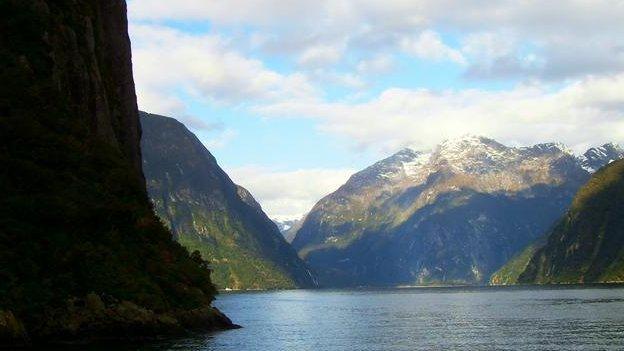
Pembrokeshire ship's captain John Grono, who named Milford Sound in New Zealand after Milford Haven, has a mountain on the South Island named after him
For a small country Wales has contributed its share to the pantheon of explorers, pioneers and settlers.
During the 18th and 19th centuries the success of the Welsh iron, copper and coal industries helped prevent a mass migration from the hills and valleys.
But in the gazetteer of world place names there is evidence of the impact made by Wales and the Welsh - even if some of these names were in fact coined by English trailblazers such as Captain James Cook.
"There are some really interesting individual stories of Welsh explorers who haven't had the attention that their adventures deserved in the age of exploration," says Dr Gethin Matthews, a history lecturer from Swansea University.
"People like John Evans (of Waunfawr, Caernarfon) who was one of the first Europeans to venture up the Missouri river in the 1790s, and David Thompson (born Dafydd ap Thomas in 1770) who explored overland from Canada, were exceptional individuals.
"Unlike our Scots and Irish counterparts the Welsh did not leave in droves in the late 19th century. The Welsh economy was in such buoyant shape between 1850 and 1914 that there was little reason to emigrate.
"However there are still places where the Welsh have punched above their weight."
Here are a few examples of Wales' footprints on the world and the stories behind them:
NORTH AMERICA
Thomas James (1593-1635), of Llanfetherin, Abergavenny, was one of many sea captains who went looking for the fabled Northwest Passage above northern America to Asia.
He surveyed Hudson Bay, named one of its main rivers the Severn, and was one of the first to explore the south coast of the Bay, where now James Bay is named after him.
Mansel Island, or Pujjunaq, an uninhabited island in Hudson Bay, was named in 1613 by Sir Thomas Button (d. 1634), a Welsh Royal Navy officer who in 1612 went in search of explorer Henry Hudson, missing on another failed quest for the Northwest Passage.
Button honoured Sir Robert Mansell (1573-1656), a Margam-born Royal Navy vice-admiral and Welsh MP.
Further south, both the US city of Thompson Falls, Montana, and Thompson River in British Columbia, Canada, the largest tributary of the Fraser river, are named after map-maker David Thompson, the London-born son of Welsh migrants.
CARIBBEAN
Sir Henry Morgan (1635-1688), the Llanrumney-born Caribbean buccaneer, certainly left his mark on Jamaica.
The one-time acting governor who became a planter on the island is commemorated in Morgan's Valley in Clarendon, Morgan's Bridge and Morgan's Pass.
On the Columbian island of San Andres, the freshwater Morgan's Cave, believed to once have been a hiding place for his pirate treasure, is now a busy tourist attraction.
SOUTH AMERICA
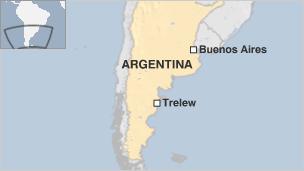
Welsh interest in Patagonia is well-documented. The city of Trelew in the province of Chubut in Argentine Patagonia is named after Caernarfon-born Lewis Jones (1836-1904), one of the founders of the Welsh settlement there.
Puerto Madryn, founded on July 28, 1865, honours fellow settler Sir Love Jones-Parry (1832-1891), whose estate in Nefyn, on the Llyn peninsula, was named Madryn.
Other Patagonian names derived from Welsh include Bryn Gwyn (White Hill), which is home to a paleontology park near Gaiman.
EUROPE
The city of Donetsk in eastern Ukraine was founded in 1869 by Merthyr Tydfil-born businessman John Hughes (1814-1889), who built a steel plant and several coal mines in the area.
Until 1924, when it was named Stalino, the city was known as Yuzokva or Hughesovska, becoming Donetsk in 1961.
AFRICA
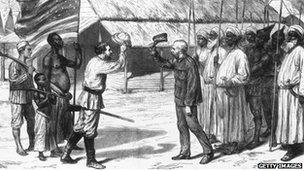
'Dr Livingstone, I presume?'
Mount Stanley, or Ngaliema, which rises 16,763 ft (5,109m) between Uganda and the Democratic Republic of the Congo is Africa's third highest peak.
It takes its name from Denbigh-born Henry Morton Stanley (born John Rowlands in 1841), who in 1869 was commissioned by the New York Herald to search for Scottish missionary and explorer David Livingstone, who had set off to search for the source of the Nile in 1866.
After finding the sick explorer in November 1871 Stanley explored vast areas of central Africa.
ASIA
The world's highest mountain Mount Everest, known in Nepal as Sagarmatha and in Tibet as Chomolungma, was named after Sir George Everest (1790-1866), Crickhowell-born surveyor-general of India.
In 1823 he travelled to India to complete the Great Trigonometrical Survey begun by William Lambton. Over 25 years he mapped almost 1,500 miles (2,400 km) of territory.
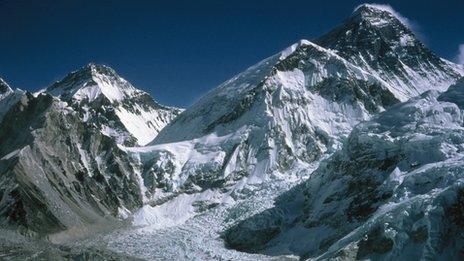
Andrew Waugh, who succeeded Everest as Surveyor General of India, named Peak XV after him in 1865
Originally dubbed Peak XV, the mountain was officially named after him in 1865.
The Western Cwm, an ice valley below Everest's south west face, was named by George Mallory during a 1921 scouting expedition for his later fateful attempt on the mountain.
Describing it as "terribly cold and forbidding under the shadow of Everest", Mallory remembered his days climbing in Snowdonia and christened it after the Welsh word for valley.
AUSTRALIA AND NEW ZEALAND
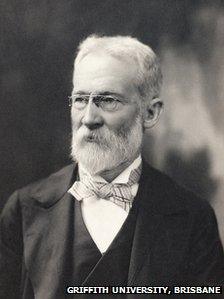
Sir Samuel Walker Griffith was born in Merthyr Tydfil
John Grono (1767-1847), a ship's captain from Newport, Pembrokeshire, emigrated to Australia in 1799. On board the ship Governor Bligh, he explored the south-western coast of New Zealand's south island, naming Milford Sound after Milford Haven, which he thought it resembled.
A river named the Cleddau also flows into the sound.
The 2,003ft (611m) peak Mount Grono on Secretary Island off New Zealand's south island, takes his name.
In Australia the suburb of the Australian capital Canberra, Griffith, was named after Merthyr Tydfil-born Sir Samuel Walker Griffith (1845-1913) who left for Australia in 1853.
Twice premier of Queensland, Griffith became the first Chief Justice of the High Court of Australia and wrote much of its first constitutional draft of 1891. A university in Brisbane also bears his name.
ANTARCTICA
Cape Evans on the north shore of Ross Island in Antarctica is the site of Scott's Hut. The area was discovered by the British National Antarctic Expedition of 1901-04 led by Robert Falcon Scott, who first named it the Skuary.
Scott built his base there on his fateful second expedition of 1910-13, renaming the cape after Royal Navy Admiral Sir Edward "Teddy" Evans (1881-1957), his second in command.
Not to be confused with Petty Officer Edgar Evans who died on the expedition just prior to Scott himself, Evans was born in London the son of a Welsh lawyer.
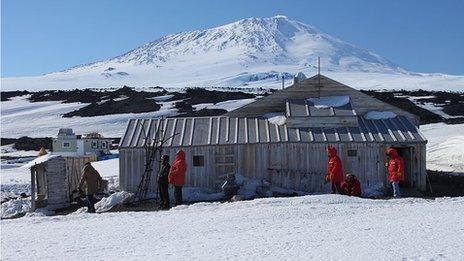
Scott's Hut at Cape Evans. (Picture Eli Duke under Creative Commons)
- Published3 October 2011
- Published3 August 2010
- Published3 August 2011